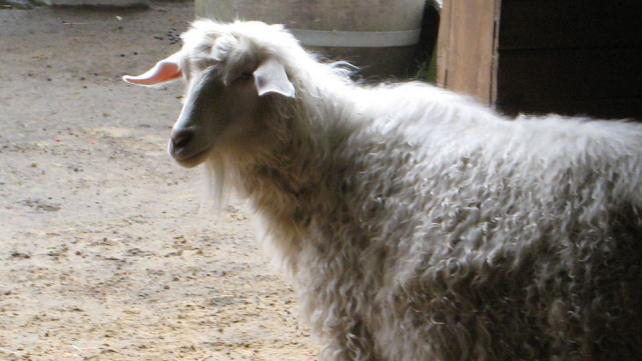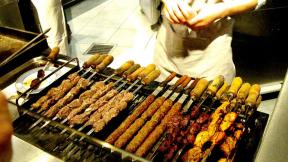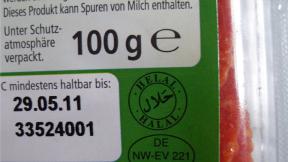
Before you sink your teeth into the next Zabiha slaughtered meat product, ask yourself: is it Zabiha Halal?
This is a question most Muslims don't think to ask, according to Ahmad Sakr, professor emeritus of Food Science and author of "Understanding Halal Food" and "A Muslim Guide to Food Ingredients" in an interview with Sound Vision from his California home this week.
The issue of Halal meat has been a bone of contention amongst North American Muslim communities.
Some Muslims argue that the meat of the Jews and Christians is Halal for Muslims. Others say the meat must be slaughtered according to Islamic rites for it to be fit for Muslim consumption.
Both groups can find support from legal opinions given by Islamic scholars.
But what's often ignored is that regardless of whether you choose to eat Zabiha Halal or not, the meat of the animal itself may not be Halal, says Sakr.
THE USE OF ELECTRIC SHOCK ON ANIMALS
With regards to meat that is not slaughtered according to Islamic rites, Sakr says it is not Halal because of the effect electric shock on blood drainage.
He explains that in regular meat slaughterhouses, animals are brought into an alley and given an electric shock to the head to make them unconscious.
The animal's legs are then tied up and it is hung upside down. A knife is put to its neck,and then it is slaughtered. The animal is then temporarily left alone to allow the blood to drain from its body. From there, the meat is processed.
But using electric shock, explains Sakr, means that all of the animal's blood does not leave its body, because electric shock affects the central nervous system.
On the contrary, if an animal is slaughtered in accordance with Islamic guidelines, the central nervous system works properly, and all of the animal's blood comes out.
Remaining blood in the animal is a source of fermentation and destruction of meat quality. This means bacteria can grow easily on the meat.
From an Islamic perspective, Sakr says it is Haram to eat meat containing blood, as it is clearly stated in the Quran that Muslims cannot consume blood.
THE CONDITIONS OF Zabiha HALAL
"Halal is Halal if the following conditions are taken into consideration," explains Sakr.
The first is that the animal is itself is Halal. That means no pork, for instance.
The second, is that the food the animal consumes does not contain any blood or meat. Sakr explains that the animal has to be herbivorous to be Halal, and adds that an animal becomes Haram if it consumes blood and /or meat.
"Islam dictates that if an animal has received meat and/or blood while it was Halal, it becomes Haram and in order to become Halal you have to put that animal in a quarantine area for 40 days before you slaughter it to make it Halal," says Sakr.
If this is not respected, "that animal will contain the disease called Mad Cow Disease," he says. (You can read more about mad cow disease at its official site at http://www.mad-cow.org/)
The third condition Sakr lists for an animal to be Halal is that it should not be given any hormones.
In the meat industry, he says beef and chicken are given female sex hormones. This is meant to increase the weight of the animal in a short period of time.
The effect of consuming an animal with injected female hormones is a reduction in the masculine appearance of boys and men. It also reduces sexual appetite, explains Sakr, adding that this of course would not happen by eating just one meal containing meat. Rather, it can result when people are consuming meat daily, and Sakr mentioned "KFC and and MacDonald's" as two examples.
But eaters of Zabiha meat should not get on a high horse either: even if an animal is slaughtered in the Islamic manner, it will still contain these hormones.
PRESERVATIVES ADD TO THE LETHAL MEAT MIX
Sakr points out that the meat industry also puts the preservatives nitrite or nitrate in meat. These react with the amino group of amino acids of the meat or protein to produce nitroso-amine. This is red pigment.
This results in meat still looking red in its color, as if it is fresh, even if it has been on the shelf for one or two weeks. While this may be good for industry, it causes cancer.
Animal food containing meat and blood, as well as dangerous hormones and preservatives lead Sakr to conclude one thing.
"If that animal has been fed all of the above, then it is no longer Halal, even if a Muslim goes to the farm and slaughters the animal in the name of Allah, [it] does not make the animal Halal."
HORMONES IN MILK TOO
In February 1994, the United States Food and Drug Administration (USDA) approved the use of another hormone for cows-estrogen. This was used to increase milk bladder size and milk excretion resulting in greater production of milk in a shorter period of time.
Estrogen can cause cancer of the breast and other cancers in general.
This is particularly frightening when we consider that many people drink milk daily, and consume its byproducts like milk, cheese and cookies.
While the U.S. Food and Drug Administration (FDA) demanded that farms put the label EST on milk cartons if they use estrogen on cows, the milk industry convinced the FDA to forego putting this label. That means you don't know if the milk you drink contains estrogen or not.
THE SOLUTION: MUSLIMS RUNNING MORE FARMS
The only viable solution, according to Sakr, is to establish farms which will be run by Muslims who will raise animals feeding them only plants, no hormones, preservatives or meat and blood.
He looks to the next generation of Muslims in North America to do that, though. Sakr points out that "most of the immigrant Muslims who came to Canada and the United States are highly educated and their impression about a farmer in their old countries, [is] that he is poor and uneducated, while we are educated."
In contrast, Sakr notes that in Canada and the U.S, Americans and Canadians may have a Ph.D. in animal sciences, for instance, but may still do farm work and not consider a lower class job.
CONSIDER SOME FORM OF VEGETARIANISM
Another option is simply eating a vegetable-based diet, as opposed to a meat based one. While Islam has not forbidden meat eating, it also has not made it a religious requirement to consume meat on a daily basis. Moderation in eating, as is the case with other aspects of life, is the key, according to Islam.
By opting for a more vegetable-based diet, this will reduce the meat intake of individuals, and lessen the amount of hormones and other dangerous chemicals ingested indirectly because of the meat.
Current science and health research has also found eating a vegetarian diet can be healthier for you.
EATING ORGANIC FOODS
Meat, dairy products and eggs that are from animals which have been fed with organic food is also an option for those who want to keep eating meat.
Organic livestock are not given antibiotics or hormones. They are given products that have been derived from natural sources.
While organic foods may be more expensive than meat bought at the supermarket, the fact that it's free of cancer-causing ingredients is well worth the cost if you want to maintain your meat-eating.
According to the Organic Farming Research Foundation based in Santa Cruz, California, about one percent of the U.S. food supply is grown using organic methods. In 1996, this represented over $3.5 billion in retail sales.
Organic foods can be bought at natural foods stores, the health food sections and produce departments of supermarkets and at farmers' markets.
Photo Attribution: "Oregon Zoo White Goat" by Marianne Madden from New York City, USA - IMG_1746. Licensed under Creative Commons Attribution-Share Alike 2.0 via Wikimedia Commons - http://commons.wikimedia.org/wiki/File:Oregon_Zoo_White_Goat.jpg#mediaviewer/File:Oregon_Zoo_White_Goat.jpg








Add new comment